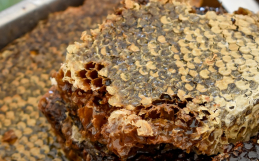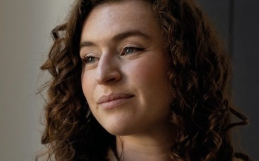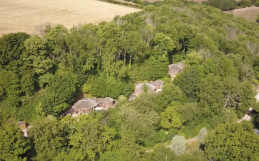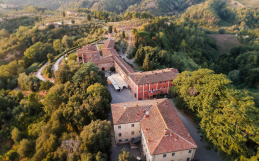By Sophie Yardley for Squarely Magazine
Within each issue, we take our readers into our member’s circle to introduce a stand out Square Club member. This issue, we had the pleasure of catching up with Benjamin Greenacre.
Greenacre is a Bristol-based producer, with quite the repertoire of shows to his name, including The Lazarus Project, Tom Jones and The Outlaws to name a few. We sat down to talk about his journey in the industry, life as a creative in Bristol, and all that’s in the pipeline.
I’m feeling very lucky that I’ve managed to catch you at what is a quieter time for you! So, how is everything going?
‘Everything’. Big question.
Honestly, it’s been a tough year for people in the film and TV industry, maybe the toughest for a couple of decades. From the turn of the year, the streamers and broadcasters cut back hugely on the number of shows they were making. In Spring, US writers and actors went on strike, with just cause I have to say, but this still meant fewer productions and even fewer jobs over here. A perfect and rather doomful storm.
Over the summer, usually the busiest time for filming, it was suggested that 75% of crews were out of work. Given how many people in Bristol work in TV directly or indirectly, that’s hundreds, even thousands of unemployed people just in Bristol. So it’s been a tough year for many, financially and mentally. Many were forced to leave the industry just to put food on the table – years of hard work building a career abandoned. As we’re mostly all freelancers, it is inevitably a feast and famine life but this year the famine went a bit biblical.
But… the end is in sight. Things are definitely on the up and already there are more productions being commissioned both in drama and documentaries. By this spring I hope things will be looking better for many. It’ll be important to keep an eye out for people who are still struggling with the mental consequences that such a long time without work might bring. Sorry – that was a bit of a downbeat answer to my first question. but I’d be doing those struggling a disservice if I suggested everything in the garden was rosy.
It’s safe to say, you’re a well-established producer, with quite the repertoire of shows beneath your belt. Can you tell us a bit more about your journey in television and how you’ve got to where you are?
How did I end up here? Luck mostly. Occasional bouts of intensely hard work too. I did have some of the basic skills useful in the early stages of any career. Making good tea and coffee for the higher ups. A relentlessly (even annoyingly) chipper disposition. The ability to appear enthusiastic and alert even when horribly short on sleep or crushingly hung-over – or both. Not panicking when it’s all going to hell in a handcart.
I directed a play at university (I skipped past acting as my on stage skills are execrable) but thought that TV and film might be better paid and a bit more impressive to girls. I’m afraid I was a fairly shallow 22-year-old. The idea was to be a producer or director in the end but there was no real plan as to how to get there. I was very lucky to get a job almost straight out of university as a production runner on a TV series in Newcastle. From there my luck continued and built up momentum, going from job to job with relative regularity. Suddenly I was a Location Manager at the somewhat callow age of 28 – but at least my youth meant I could cope with the crazy hours and lack of sleep. I’d definitely struggle now aged 53.
Nine years later I suddenly realised I was no closer to being a Producer and that I was rather fed up with location managing. It can be a very creative job, working with the Director and Production Designer helping shape the look of the production, but there’s also a lot of telling people where the loos are – and the early mornings are far from fun. So I gradually moved over to being a Production Manager and then fairly quickly to being a Line Producer.
But there’s no fixed way of getting to be a Producer. I do think it’s important to keep your eye on your goals in your career – to just check in every now and again with the end game. I probably spent too much time being a location manager – but I was having a lot of fun at the time both at work and in the evenings so I was rather distracted.
I think back to the times when you would come and nestle yourself in a quiet corner of our garden to get your head down with some work in-between flying to and from Belfast whilst you were producing Tom Jones! It was a busy time for you, how did you find working on the project?
I loved it. I had my chance and I was determined to do a good job. We shot Tom Jones in Northern Ireland but the post production was spread between Belfast, London and me in your garden at The Square in Bristol. I hadn’t done post before – line producers scarper after the shoot has finished. The edit, the grading, sound mixing, VFX and so on were all new to me and there was lots to learn. That’s one of the great things about this industry: you’re always learning and there’s always something new.
I’m sure many of our readers have watched Outlaws, which you worked on as a line producer. It’s always such a thrill watching anything filmed in Bristol! How was it working on the series?
It was a challenge but a huge pleasure. We had Covid to contend with. I think we were the last drama production in the country to stop working, just a day before Boris locked the country down. We’d shot for 2 weeks by then and had to work out how to get the other 21 weeks of filming done. It wasn’t easy. January and February 2021 in particular were very tough on the crew mentally – there was a lot of anxiety and even fear. The Execs involved were fantastically supportive of the crew and cast and were very aware of the pressures on all involved. In the end, everyone was incredibly brave and resilient, the safety protocols worked (on Series 1 at least) and we managed to avoid having outbreaks shut us down.
Despite Covid, it was bloody brilliant being on a show about Bristol. I’ve shot a lot here when we’re pretending to be in London and we have to spend time and money covering up Bristol. To be celebrating my home town was a real buzz. Stephen Merchant is Bristol through and through and it was very important to him to put it front and centre, from driving over the Suspension Bridge, to chase sequences in Broadmead, to wandering past Turbo Island, to running a gin palace up and down the docks, to painting over a real Banksy (yes it was definitely a real Banksy), we showed Bristol being Bristol and, as a Bristolian myself, I couldn’t have been more proud.
You’ve worked on such a variety of projects, ranging from Black Mirror and Avengers to mini-series’ produced here in Bristol. In taking on new projects, what do you look for?
After my unplanned break from work I was looking for any project who wanted to pay me – although I’ve been really lucky and ended up with a fantastic job I would have been desperate to do anyway. Something different always appeals. Something where I’ll be learning something new is important. Something ambitious is vital. But most of all the people make the difference to me. Good people, collaborative, creative, clever, resilient but most of all friendly and just plain nice make a show a pleasure to work on. That’s why I like working in Bristol so much.
What have been your favourite projects to work on?
Tom Jones was as perfect a first producing job as it could be. The director was brilliant and generous, the crew and the cast were, without exception, fantastic and lovely. Every day turning up on set was a pleasure and there aren’t many jobs I can say that about. The Outlaws gave me a chance to big up Bristol on camera and I’ll always be proud of that. The assistant coordinator and I set up a training scheme during the production and some of those who took part are still thriving in the industry. Giving people who might not normally get a chance in our industry their first start is incredibly important and rewarding. Every production should do it.
I did a couple of adverts for Mastercard Priceless Surprises series. I got to watch Mark Ronson recording and mixing a record at Abbey Road which was like watching magic happen. But even better than that was the extraordinary day we gave to the people we were surprising – a day they’ll never forget. Their excitement and, frankly, joy was infectious and everyone around them was smiling all day. I’ve never been hugged and thanked by so many crew at the end of what should have been along, gruelling day.
Tomb Raider II was a job that really made location managing seem as glamorous as it could be – I should have realised that working in locations was going to be an anti-climax after that. Four hours after being hired I was on a plane to Kenya to help out for a few weeks. I’d never been anywhere in Africa and it was astounding. I was in the most beautiful, dramatic safari parks – whilst being paid. I had to move on a herd of elephants who were wandering through a location, got far too close to a pack of hyenas in the dawn mist, got stuck in a wildebeest traffic jam, buzzed zebra (accidentally) in a helicopter, parked up airplanes like they were minibuses – all nothing I’d ever done before or since. Glorious madness.
I like that my children are at least a little impressed that I worked on The Avengers and on Hellboy, I was very proud when my son Bobby, aged about 6 at the time, was brave enough to shake hands with David Harbour in his full costume and make up.
Do you have any advice for those wanting to get into the industry?
Be patient, friendly and packed full of positive energy, make good tea and coffee (and then when it’s time to move up, don’t) and remember what your goal was when you started out.
So, what’s next in the pipeline for Mr Greenacre?
The film I’m on is shooting until April, and then I’ll be hunting for the next job. The imminent arrival of 2024 feels exciting – especially after the unexpected awfulness of 2023. Next year will be a good, even a great year for Bristol’s TV and film industry, for both the drama and unscripted worlds. There are so many fantastic companies here (including the treasure that is The Bottle Yard Studios), so many fantastic crew members with so much talent, enthusiasm and ambition – and they’re pretty much all bloody lovely people too. Bristol is the most popular base for TV production outside London because of those people and those companies and that popularity will only increase. The industry brought in over £20,000,000 of inward investment to the city in 2022, employed thousands of people and made some of the most popular, ground-breaking, brilliant TV in the country and even the world – and there’s more to come in 2024.
Although Greenacre is very modest and puts many of his achievements down to luck, it is clear that his journey has not been without hard- work and determination. I can certainly vouch for the fact that Greenacre is one of those people whose presence lights up a room, so it is no surprise to see his success. We’re excited to continue following his journey and to see what’s next in the pipeline!
You can learn more about Greenacre’s work here.
To read more from Squarely, head to stage.thesquareclub.com/squarely-magazine/











